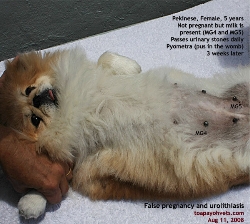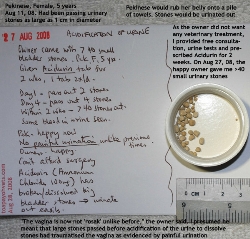|
Dec 17, 2008
What can you say to the owner whose beloved Pekinese died in
pain and suffering in front of his eyes? I met him on Dec
17, 2008 and all I could do was listen to his grief on the day his dog
died.
Going back in time, around August 2008, the dog had passed
>17 urinary stones. I advised surgery and X-rays but he did
not take up my advice as he said he had no money for veterinary
surgery. He did not ask about the cost nor did I mention it.
 The Pekinese could pass out the urinary stones. Sometimes
she would exert and strain to pass out the bigger stone. "If only
she produces diamonds every 2 days as she produces stones,"
the owner had a sense of humour. I gave him free
consultation and antibiotics a few times as he would not
want to bring his dog in for surgery after one visit in
August to consult me.
There were no large bladder stones palpable but the bladder
was full of gas as I felt crepitus inside the bladder.
Crepitus refer to a feeling of gas and grinding stones
inside the bladder. There was milk present in the
mammary glands of this Pekinese at this time. "The dog has
false pregnancy," I showed the milk to the owner.
Normally I would advise spaying the dog to prevent pyometra.
But it would be insensitive of me to talk about surgery. The Pekinese could pass out the urinary stones. Sometimes
she would exert and strain to pass out the bigger stone. "If only
she produces diamonds every 2 days as she produces stones,"
the owner had a sense of humour. I gave him free
consultation and antibiotics a few times as he would not
want to bring his dog in for surgery after one visit in
August to consult me.
There were no large bladder stones palpable but the bladder
was full of gas as I felt crepitus inside the bladder.
Crepitus refer to a feeling of gas and grinding stones
inside the bladder. There was milk present in the
mammary glands of this Pekinese at this time. "The dog has
false pregnancy," I showed the milk to the owner.
Normally I would advise spaying the dog to prevent pyometra.
But it would be insensitive of me to talk about surgery.
I did not
charge him as I was the one who asked him to get the dog in
for a review. All I could help the suffering Pekinese was to
prescribe antibiotics and medication to acidify the urine
free of charge. "The dog felt less pain in urination after
the medication - urination is now not so "rosak (Malay
expression for fried?)", the owner told me.
Over the next few weeks, the dog peed out
urinary stones almost every day. Sometimes one big stone
over 4 mm in diameter, sometimes a few smaller ones. All of
the same colour.
One Saturday in September, the Pekinese vomited and passed a lot of
pus in her vaginal discharge. As he brought in the dog on a
Saturday when I was on leave, my associate
examined the dog and diagnosed pyometra (pus in the womb).
The owner took the dog home. He got his dog
operated by another vet who charged lower fees.
Some days later, when he saw me, he explained that
his wife brought him to Vet 1 who offered a lower fee in
view of his financial circumstances. "It is OK with me, " I
understood his need to save money in a time of recession.
His business was not thriving and his wife might have more
confidence in my competitor. This is part and parcel of any
business.
 Vet 1 removed the womb.
"The dog still passed out dirty discharge over the next 7 days,"
the owner said to me when I met him outside the Surgery.
"Why so many days?" Vet 1 removed the womb.
"The dog still passed out dirty discharge over the next 7 days,"
the owner said to me when I met him outside the Surgery.
"Why so many days?"
"Did Vet 1 give you antibiotics after the surgery?" I asked.
"No," he said. "I told Vet 1 you had given the dog
antibiotics." But the course of antibiotics was over for
some time.
"Why didn't you tell Vet 1 that the dog was no longer on
antibiotics at the time of surgery for pyometra?", I had
given him antibiotics much earlier to treat the bladder
infections.
The owner did not reply. I gave him antibiotics
free of charge to clear the infections. Now, this infection
was more likely to be due to
bacterial infection of the bladder as the infected womb was
removed and there would be no more purulent vaginal
discharge due to pyometra.
Vet 1 had done a good
job of removing the womb. He had presumed that the owner had
antibiotics from me and therefore did not prescribe any to
save veterinary costs for the owner.
The infection cleared soon after. "The taxi fares to Vet 1
cost a lot," the owner said to me as he was working around
my Surgery. "I have to bring the Pekinese to Vet 1 to remove
the skin stitches."
I removed the nylon stitches from
the skin for the dog. I understood that the owner needed to
save money as his business dropped drastically due to the
melamine scare. He was selling products associated with milk
and melamine contamination of his products existed. "Did
your dog eat ice-cream in the past?" I asked him. "No," he
said. "My dog eats home-cooked food.
"How about dry dog food," I asked.
"My dog eats home cooked food.
Ice-cream was one of the products in Singapore banned for
melamine contamination in August. Children in China produced
urinary stones after drinking contaminated milk. Some dogs
died eating dry food contaminated with melamine some years
ago. Yet this Pekinese did not consume either of the above
mentioned products. She produced urinary stones without fail
for 5 months, on a daily basis.
The owner collected the stones and gave some 50
stones. One day I asked him, "What did Vet 1 advise about the stones?"
He replied, "Vet 1 says that there is no point having
bladder surgery to take out the stones since the dog will
continue producing stones." This was a difference of
opinion from mine. I advised removal of the stones and
prescription diet. But I cannot guarantee that urinary
stones will not re-form again.
Then one day in December, the owner phoned me at night. "My
wife took the dog to Vet 1 as the dog could not pass urine.
The large stone was stuck inside her. She vomited many times. She came back from Vet 1
and the dog is still screaming. Can I pay you half your
surgical fees and pay the other half later when you operate
tomorrow?"
"With vomiting, the dog's kidneys would be infected. In
addition, the dog would have toxic blood. It is best you get
her to Vet 1 immediately to get emergency surgery
immediately." This was now a very high risk anaesthetic
case. It was better that the dog be handled by Vet 1 who had
done some treatment earlier but had sent the dog home after
removal of the stone. There must be more stones being stuck.
I did not hear from the owner after that phone call. I
presumed his wife had got the dog to Vet 1 for treatment.
Around 2 weeks later, on Dec 16, 2008 I met him and asked what happened to
his dog.
"I went back to Vet 1 that night after I phoned you. Blood gushed out as Vet 1's "nurse"
inserted an instrument into the dog. She pulled out the stone from the dog. The dog screamed in pain."
He was distressed in seeing his dog suffering. "The vet gave
an injection."
"What happened after the injection?" I asked.
|